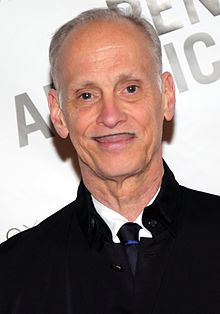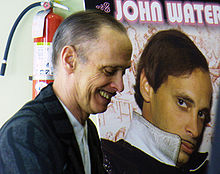John Waters (Director)
John Waters (born April 22, 1946 in Baltimore , Maryland ) is an American film director , author , actor and visual artist . His films, which deliberately crossed the boundaries of the “good taste” of the bourgeoisie, earned him the nickname “The Pope of Trash”. Today he is considered one of the most important artistic pioneers of the gay movement .
Live and act
John Waters was born into an upper-middle-class Catholic family in Baltimore. His parents Patricia Ann Whitaker (1924–2014) and John Samuel Waters (1916–2008) were manufacturers of fireproof clothing. Even before he graduated from school, he was working with friends on his first short film Hag in a Black Leather Jacket . After dropping out of New York University , he returned to Baltimore, where he made more radical short films. The constant lead actor in these short films was his close friend Glenn Milstead alias Divine , at his side were Edith Massey , Mink Stole , Mary Vivian Pearce , Susan Lowe and David Lochary, other friends of Waters, collectively this group was called Dreamlanders .
John Waters has long been considered the "black sheep" among filmmakers: his early works, Pink Flamingos (1972), Female Trouble (1974) and Desperate Living (1977), collectively known as the " Trash Trilogy", often contained frowned upon and strictly taboo sexual topics such as trans- and homosexuality, incest and zoophilia , as well as scenes that challenge the viewer's disgust. At the same time, they were satires and attacks on American culture and the bourgeoisie of which Waters himself came. The low-budget films , whose budgets were in the five-digit dollar range, attacked many elements of contemporary queer culture and thus triggered strong controversies within the conventional understanding of cinema , provoked censorship and - according to some critics - also the limits of good taste. Nevertheless, they became a success, especially with young, open-minded moviegoers, as Midnight Movies and ultimately became cult films . Today, John Waters' uncompromising films are recognized and recognized as groundbreaking milestones in contemporary film culture. Waters himself sees his films as deliberately made "good bad taste" films and stated:
“For me, entertainment is all about bad taste. If someone vomits during my films, it's like a standing ovation. But you have to remember that there is such a thing as good bad taste and bad bad taste. It's easy to disgust people if I did a movie that just had 90 minutes of people's limbs chopped off, but that would be bad bad taste and not very stylish or awesome. To understand bad taste, you have to have very good taste. Good bad taste should be nauseating in a creative way and at the same time have a particularly twisted sense of humor that is anything but universal. "
From Polyester (1981), a satire on small town life and Douglas Sirk - melodramas in which, with Tab Hunter for the first time a "serious" actor was involved, to Waters turned increasingly to the cinematic mainstream. The nauseating moments in his films became less and less, the budgets of the films and the awareness of the actors increased, but shrill moments and the satirical peaks against American society persisted in his later films. Hairspray was from the year 1988 to an audience success and later even than Broadway - Musical implemented that with the 2003 Tony Award was awarded. Shortly after the premiere of Hairspray on March 7, 1988, Waters Muse Divine died, whereupon the leading actors of Waters' films changed from then on, including Johnny Depp in Cry-Baby (1990) and Kathleen Turner in Serial Mom ? (1994). Since the failure of his last film, A Dirty Shame, in 2004, Waters has concentrated on his other fields of activity, also because he has found it difficult to finance a new film. He said in an interview in 2017:
“They all want you to make a film for under a million dollars, which I don't want. At 70, I don't want to be a supposedly radical filmmaker anymore. I did that. I don't have to do it again. "
Waters has already stood in front of the camera several times for film and television productions by other directors. In the Simpsons episode Homer's Phobia he played a fictionalized version of himself. He has also been a photographer and visual artist since the 1990s. The majority of his photos consist of pictures taken from the television, partly revised and recombined with other pictures from his (partly also his own) favorite films. In other pictures, he has edited his face as it would look if he had plastic surgery behind him. In 2004 John Waters exhibited his works at the Fotomuseum Winterthur . Waters is also active as a stand-up comedian and author, who has published around ten books since the early 1980s. In 2012 he published the travel book Carsick , in which he reports on his experiences as a hitchhiker across the United States.
In 2019 he was awarded the Leopard of Honor for his life's work at the Locarno Festival .
Waters is openly gay and campaigns for homosexual rights. He lives in his hometown of Baltimore, but also has secondary residences elsewhere in the US.
Filmography
As a director
- 1964: Hag in a Black Leather Jacket (8 mm)
- 1966: Roman Candles (8 mm)
- 1968: Eat Your Makeup (16mm)
- 1969: Mondo Trasho (16 mm)
- 1969: The Diane Linkletter Story (16 mm)
- 1970: Multiple Maniacs (16 mm)
- 1972: Pink Flamingos (16 & 35 mm)
- 1974: Female Trouble (16 & 35 mm)
- 1977: Desperate Living (16 & 35 mm)
- 1981: polyester (35 mm)
- 1988: Hairspray (35mm)
- 1990: Cry-Baby (35 mm)
- 1994: Serial Mom - Why doesn't mom stop killing? ( Serial Mom ) (35mm)
- 1998: John Waters' Pecker (35mm)
- 2000: Cecil B. (Cecil B. Demented) (35 mm)
- 2004: A Dirty Shame (35mm)
As an actor (selection)
- 1989: Homer and Eddie (Homer and Eddie)
- 1997: The Simpsons ( The Simpsons ; Follow Homer and Certain Fears - voice)
- 2002: Blood Feast 2: All U Can Eat
- 2004: Chuckys Baby (Seed of Chucky)
- 2006: This Filthy World , John Waters' 90-minute solo performance, directed by Jeff Garlin
- 2007: Hairspray (cameo in the opening of the musical film adaptation)
- 2012: Excision
- 2014: Suburban Gothic (as a performer)
- 2015: Alvin and the Chipmunks: Chip Road ( Alvin and the Chipmunks: The Road chip ; Cameo)
- 2017: Feud - The enmity between Bette and Joan ( Feud: Bette and Joan , TV series, episode Hagsploitation )
- 2018: The Blacklist (TV series, episode Sutton Ross )
- 2020: Law & Order: New York (TV series, episode Dance, Lies and Videotape )
bibliography
(Dates of first publications)
- 1981: Shock Value
- 1987: crackpot
- 1988: Pink Flamingoes and Other Filth: Three Screenplays by John Waters
- 1988: Hairspray, Female Trouble, and Multiple Maniacs: Three More Screenplays
- 1997: Director's Cut
- 2003: Art: A Sex Book (with Bruce Hainley)
- 2006: Unwatchable
- 2010: Role Models
- 2014: Carsick
- German: Carsick. My incredible hitchhiking trip across America. Ullstein Extra, Berlin 2015, ISBN 978-3-86493-033-1
- 2019: Mr. Know-It-All: The Tarnished Wisdom of a Filth Elder
Awards (selection)
- 2019: Pardo d'onore (Leopard of Honor) of the Locarno Festival
Web links
- Literature by and about John Waters in the catalog of the German National Library
- John Waters in the Internet Movie Database (English)
- Interview August 18, 2019
Individual evidence
- ↑ JOHN WATERS: THE POPE OF TRASH. Accessed March 26, 2019 .
- ↑ John Waters, The "Pope Of Trash". Accessed March 26, 2019 .
- ↑ John Waters Biography (1946-). Retrieved March 26, 2019 .
- ^ Guy Barefoot: Trash Cinema: The Lure of the Low . Columbia University Press, 2017, ISBN 978-0-231-54269-2 ( google.de [accessed May 11, 2020]).
- ^ Tony Award. ( Memento from March 19, 2012 in the Internet Archive ) 2003 for Musical Hairspray
- ↑ Joe Blevins: Obscene and Unheard: The Unmade Films of John Waters. In: Volture. November 20, 2015, accessed March 26, 2019 .
- ↑ Rebecca Nicholson: John Waters: 'A new kind of anarchy is going to happen next' . In: The Guardian . February 13, 2017, ISSN 0261-3077 ( theguardian.com [accessed March 26, 2019]).
- ↑ Nadja Sayej: John Waters: 'I never wanted to be a cult film-maker' . In: The Guardian . October 8, 2018, ISSN 0261-3077 ( theguardian.com [accessed March 26, 2019]).
- ^ Trash and Crash in the Fotomuseum Winterthur . news.ch. June 2, 2004. Retrieved May 31, 2011.
- ↑ dreamlandnews
- ↑ Christopher Brocklebank: Cult gay director John Waters has new book out , pinknews.co.uk, May 28, 2010
- ^ John Waters Pardo d'onore Manor at Locarno 72 . Retrieved April 9, 2019.
- ↑ John Waters receives honorary leopards in Locarno . Article dated April 9, 2019, accessed April 9, 2019.
| personal data | |
|---|---|
| SURNAME | Waters, John |
| BRIEF DESCRIPTION | American film director |
| DATE OF BIRTH | April 22, 1946 |
| PLACE OF BIRTH | Baltimore , Maryland , USA |


